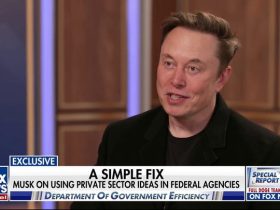Hamish McKenzie, the co-founder of Substack, is suddenly speaking out.
‘We are living through the most significant media disruption since the printing press, and it explains everything from why you can’t stand your neighbor to our current political tumult.’
Today, he says on his site, ‘we live in a more chaotic environment, where the narrative frenzy of social media has given rise to political movements that gain power through exploiting attention of any kind, positive or negative, from moral panics to fulminating podium-thumpers. We’ve gone from ‘Ask not what your country can do for you’ to dunk tweets and death-by-emoji.’
Obviously, it’s in McKenzie’s interest to portray a media revolution with him as the chief rebel. When Substack launched in 2017, it was viewed as an intriguing experiment, an outlet largely for those who didn’t have one.
But in the Trump era, with his constant cable appearances and Truth Social posts, there’s little question that we’re submerged in a toxic environment. The president gets this, which is why he’s done a number of podcast interviews.
He went on Joe Rogan and Kamala, uh, did not.
Now, with big-name journalists giving up prime television gigs in favor of the site’s independence, we are living in the Substack Era. What was once viewed as the Holy Grail – an anchoring or hosting job on a major network – is now dismissed as old-school legacy media with too many corporate constraints.
Take my former Fox colleague Chris Wallace. He left for CNN (actually CNN-plus, which was euthanized in three weeks) and then launched a Saturday talk show. But Chris recently announced he’s leaving the network to go independent, which undoubtedly includes Substack.
Another ex-Fox colleague, Megyn Kelly, had a similar experience. Having been dropped by NBC after a bad experience there, she started a daily show and video podcast on Sirius XM, and now has 3.2 million subscribers on YouTube.
Chuck Todd, having been eased out of his ‘Meet the Press’ job, was given an online streaming show. But not long ago he announced he was leaving NBC to go independent.
When Dan Abrams gave up his NewsNation show after three years, he said: ‘As much as I love this show and the mission of this network, I just can’t continue to give this show the attention it needs and deserves with all of my other professional commitments.’ The Mediaite founder later announced that he is concentrating on creating a YouTube channel for the site, working with other media folks.
McKenzie’s great insight is that he could connect writers and podcasters directly to their audience, with Substack taking a cut. They can opt for a revenue-sharing agreement. Now you might ask, what if you’re not a famous former anchor or commentator?
Turns out that niche sites do really well. They can work at other jobs at the same time. Many users report a six-figure income.
This is especially striking in that most Substack people let you read their sites for free, or a shortened version, with the full column and special features available only for paying subscribers. The hope is that some of the freeloaders will become subscribers over time.
Not everyone winds up at Substack voluntarily. Chris Cillizza, the former Washington Post columnist, is quite candid in saying he came to Substack after being laid off at CNN. He found himself with little to do after dropping the kids at school.
‘I started this Substack — selfishly — to help me grapple with my changed life. To give me a platform where I could express myself — hopefully to an audience — about the world of politics, yes, but also how I was navigating a new reality.’
He has slowly built a following and chats with Todd once a week, which is something that Substackers do.
Casandra Campbell of Really Good Business Ideas analyzed the 29 most popular Substacks.
The first two are Letters from an American (hundreds of thousands of paid subscribers for political history) and Broken Palate. Michael Moore was No. 3, and the only other names I recognized were former candidate Allen West, the Bulwark, and ex-Labor Secretary Robert Reich.
The others had names like Dr. Mercola’s Censored Library, DeLa Soul, The Pragmatic Engineer and The Cryptonite Weekly Rap.
‘Our political culture now mirrors chaos media culture,’ McKenzie says. ‘Opponents are not just to be argued against, but humiliated.’ Good luck changing that.
Look, I subscribe to several Substack accounts. I’d like to subscribe to more but, with fees ranging from $5 to $40 a month, it gets expensive. So I read others for free and ponder whether to upgrade.
I don’t agree that this is the biggest deal since the Gutenberg press, around 1440, but it’s having an impact on the media and political culture. Substack is hot, and there are competitors, mainly because journalists and politicos crave a connection that goes beyond the craziness of the Trump age.







